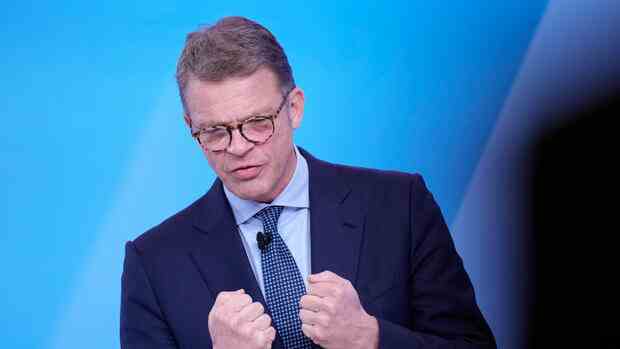The Deutsche Bank boss presented the annual results of his institute in Frankfurt.
(Photo: Getty Images)
Exactly 1306 days ago, Christian Sewing publicly declared the goals against which he wants to be measured in the restructuring of Deutsche Bank. The most important requirement: by the end of 2022, the crisis-ridden financial institution should achieve a return on equity of eight percent. Back then, very few people believed that bankers and banks could do that.
On Thursday, the CEO reported completion. Deutsche Bank even achieved a return of over nine percent for the past financial year.
This is without a doubt a success. But the figures also show that this success is not only based on strategic foresight, but also on a bit of luck. Because without a lavish tax effect in the USA, the largest domestic financial institution would have clearly missed its return target. The bank also benefited from volatile markets and indirect state aid.
The pandemic caused violent price fluctuations and thus high activity on the trading floors. At the same time, the lavish state support programs prevented a wave of bankruptcies in the corporate landscape and thus greater damage to the lending business of the banks.
Last but not least, the interest rate turnaround by the central banks came at exactly the right moment to ensure pleasing figures in corporate and private customer business.
>>Read here: Deutsche Bank achieves best result in 15 years in 2022
However, none of these external factors detract from Sewing’s performance as a renovator. Deutsche Bank’s earnings mix is more balanced today, and the investment bank is less risky. Unlike some rivals, the Frankfurt-based company recently managed to avoid the biggest accidents in the industry, such as the collapse of the US hedge fund Archegos or the bankruptcy of the British supply chain financier Greensill. This speaks for a functioning risk management, which was by no means always the case in the past.
Perhaps Sewing’s greatest achievement was getting employees ready for the tough transition that cost thousands of jobs. Now the CEO needs a new future project to inspire his bankers and investors. So far, the plan for the coming years seems to consist of a courageous “keep it up”. That may be enough for the moment, but not in the long term.
One indication of this shortcoming is the price reaction to the annual figures. Because pre-tax profit and earnings in the fourth quarter of 2022 fell slightly short of analysts’ expectations, the share fell by more than four percent at times – on a day when the leading German index, the Dax, was clearly up.
More: Savings banks in Baden-Württemberg have to write off almost a billion.
